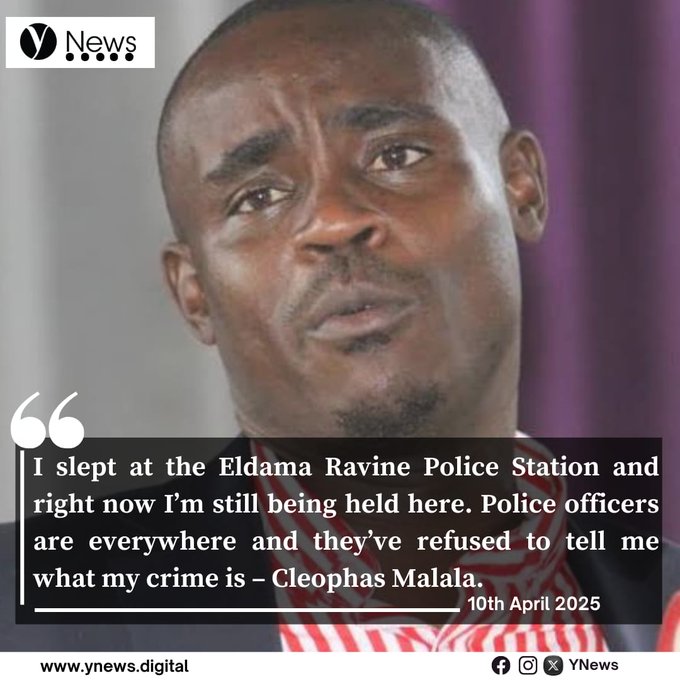NAIROBI, Kenya — A stage play about Kenya’s governance crisis has turned into real-life political theatre. After being detained for over eight hours without charges, former UDA Secretary General and playwright Cleophas Malala is pushing back—hard—against what he calls a dangerous government overreach.
The controversial drama, Echoes of War, written by Malala and performed by students from Butere Girls High School, has become the epicenter of a national storm over censorship, youth empowerment, and artistic freedom.
And if the chaos unfolding at Kirobon Girls Secondary School this week is anything to go by, the stakes are only rising.
Cleophas Malala remains under arrest, reportedly because of the play he scripted for Butere Girls, Echoes of War.@Cleophasmalala
Malala: “This Isn’t Incitement—It’s Truth”
Speaking to Spice FM by phone after his release from Eldama Ravine Police Station, Malala didn’t hold back.
“We are very disappointed by how the government is handling this matter,” he said. “I empathise with the students of Butere Girls who had given themselves to nurture their talents and expose the evil deeds of this country.”
Malala, once a prominent insider within the ruling party, is now finding himself on the other side of the state’s iron fist.
He described the deployment of police officers to the school grounds—where the students were rehearsing for the 63rd edition of the National Drama Festival—as intimidation meant to muzzle free speech.
“It’s just a play,” Malala insisted. “The youth—especially the Gen Zs—are demanding better governance, universal healthcare, and accountability. The script is about those real struggles, not some imagined incitement.”
Arrests, Tear Gas, and a Deafening Silence
The former Kakamega Senator revealed he had been held without formal charges and had not been briefed by any senior officers at the Nakuru police headquarters about the reason for his arrest.
His detention came just hours before the scheduled performance of Echoes of War—which students later declined to perform after a heavy police presence surrounded the venue.
As tension escalated, tear gas canisters were reportedly lobbed at students and journalists gathered outside the school.
According to eyewitnesses, the mood quickly shifted from festive to fearful, with students visibly shaken and in tears.
Democratic Action Party-Kenya (DAP-K) leader Eugene Wamalwa didn’t mince words either. “What’s happening is reminiscent of a return to dictatorship,” he said, promising to take legal action over what he termed unconstitutional suppression of student voices.
At the core of this unfolding drama isn’t just a school play—it’s a reckoning with how Kenya handles dissenting voices, especially those coming from the country’s youth.
Echoes of War explores themes of governance, corruption, and post-conflict recovery—subjects that clearly hit a nerve.
Malala, who previously faced similar censorship in 2013 over his play Shackles of Doom, seems unfazed by the backlash.
“I cannot be intimidated,” he said. “I will write what I want. I will think the way I want. Nobody can censor me.”
The incident has sparked growing calls from artists, human rights activists, and politicians for greater protections of creative expression in Kenya—especially in academic settings where talent is nurtured, not policed.
Whether Echoes of War makes it to the stage or not, it has already made its mark—and perhaps more importantly, sparked a necessary national conversation.
The censorship, arrests, and tear gas may have stifled the performance, but they’ve amplified the message louder than any stage could.
In Malala’s words: “This is about the people. It’s about truth. And truth doesn’t need permission to be told.”




